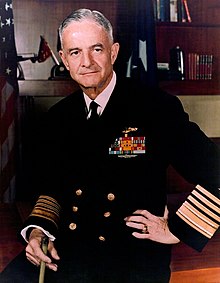John S. McCain Jr. | |
|---|---|
 | |
| Nickname(s) | Jack |
| Born | January 17, 1911 Council Bluffs, Iowa, U.S. |
| Died | March 22, 1981 (aged 70) Over the North Atlantic |
| Buried | |
| Allegiance | United States |
| Service | United States Navy |
| Years of service | 1931–1972 |
| Rank | |
| Commands | United States Pacific Command United States Naval Forces Europe Atlantic Reserve Fleet Eastern Sea Frontier Amphibious Forces, Atlantic Fleet USS Albany (CA-123) Submarine Squadron 6 USS Dentuda (SS-335) USS Gunnel (SS-253) |
| Battles / wars | World War II Korean War Vietnam War |
| Awards | Navy Distinguished Service Medal (2) Silver Star Legion of Merit (3) Bronze Star Medal |
| Spouse(s) | |
| Relations | John S. McCain Sr. (father) John S. McCain III (son) Meghan McCain (granddaughter) |
John Sidney McCain Jr. (January 17, 1911 – March 22, 1981) was a United States Navy admiral who served in conflicts from the 1940s through the 1970s, including as the Commander, United States Pacific Command.
The son and namesake of a naval officer, McCain grew up in Washington, D.C., and graduated from the U.S. Naval Academy in 1931, after which he entered the submarine service. During World War II, he commanded submarines in several theaters of operation and was responsible for sinking several Japanese ships, eventually being decorated with both the Silver Star and Bronze Star. After the war, he held a variety of commands, specializing in amphibious warfare. He led the U.S. invasion of the Dominican Republic in 1965. He also served in several posts in Washington, including the Legislative Affairs Office and as Chief of Naval Information, where he became influential in political affairs. He was a staunch anti-Communist, and his advocacy of a strong naval presence earned him the nickname of "Mr. Seapower".
During the Vietnam War, McCain was Commander-in-Chief, Pacific Command (CINCPAC), commanding all U.S. forces in the Vietnam theater from 1968 to 1972. He was a stalwart supporter of President Richard Nixon's policy of Vietnamization. McCain played a significant role in the militarization of U.S. policy towards Cambodia, helping to convince Nixon to launch the 1970 Cambodian Incursion and establishing a personal relationship with Cambodian leader Lon Nol. McCain was also a proponent of the 1971 incursion into Laos. He retired from the Navy in 1972.
His father, Admiral John S. McCain Sr., was a naval aviator and Task Force commander during World War II. They were the first father-son pair to achieve a four-star rank.[1] His son, John S. McCain III, was also a naval aviator who was a prisoner of war in North Vietnam during McCain's time as CINCPAC, and later became a United States Senator and presidential candidate.